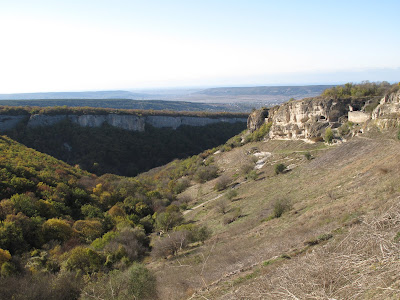The school year is off to a good start and I'm glad to be busy with the students and preparing for what comes after November 23rd when my service ends. I've got a running list of topics I wish to write about and share that I'll hopefully get to the next few weeks.
In August I had the pleasure of visiting the Mennonite Centre in Molochansk, a town in Zaporizhia Oblast. Molochansk was one of the central Mennonite settlements in the nineteenth century. It was founded in 1804 as Halbstadt, Molochansk refers to the river that runs through the area. Originally I thought this center was under the direction of the Mennonite Central Committee that has operations in Ukraine but I quickly learned that it is independent of this organization. I'd been wanting to visit this part of Ukraine since receiving my Peace Corps placement, hearing about it historically through church publications and college lectures on Russian imperialism.
After winning land from the Turks, in 1763 Catherine the Great sent a decree inviting German settlers to the vast plains of Ukraine to colonize it. She promised them religious freedom, greatly sought by the various sects of Christians who had fled parts of Prussia and the Netherlands. Mennonites built over fifty villages in the Zaporizhia region, having important roles in the politics and business of the cities of Zaporizhia and Dnipropetrovsk. They were respected for their work ethic and agricultural skills that blessed the empire with grain, greatly pleasing the Czarist family who would visit on their trips to and from Crimea.
With the upset of the First World War, the Second World War, and Stalin's campaigns; almost all Mennonites left Ukraine by the 1940s, some being deported to Kazakhstan. Mennonites from this region were greeted in Canada, parts of South America including Paraguay, and the plains of the United States. During the rest of the 20th century, the settlements were Ukrainianized, changing names and collectivized. With their love of history and ancestry, many people with roots visited the region over the years. Today there are popular Mennonite tours through Russia and Ukraine to look at former settlements. It was during one of these tours that a group of Canadians took great interest in the overall deterioration and poverty present at the birthplace of their parents. Thus, in 2001, The Friends of the Mennonite Centre in Ukraine was established and the Mennonite Centre opened. A group of directors from Canada rotate, supported by a local staff that run the center.
I was extremely impressed by their operations. The Mennonite Centre offers community development programs; providing health care, farm assistance, meals, youth programs, and scholarships. The Mennonite Centre acts as a base for historic preservation of the area, including a library of books written by Canadians and Americans about the former colonies. It was interesting to look through old photos and note that services available back then are still needed today in modern Ukraine but are lacking: schools for the deaf and blind, training schools, lush farms.
During my visit Linda and Ben Stobbe, whose parents came from this area, took me around Molochansk and villages in the area. It was the only time I've been in a car while passing through vast fields, so it was fun to stop and take pictures of interesting buildings and characters. I learned so much from them on this tour. One thing that I had no clue about before this was the great cultural differences between the Mennonites that came to the Russian Empire and the ones that came directly from Switzerland to the United States like my family did. The Mennonites that came directly west are much more socially conservative than the ones that headed east. They were much less inclined to have public roles, have excess wealth, or heaven forbid listen to music. Thus, I was quite confused when Ben and Linda would point out a huge structure as being a former Mennonite mansion, complete with a concert hall.
One of the most amazing parts of their tour was stopping by the home of a woman named Margarita. Margarita is believed to be the last remaining German, she is in her 90s. Much to her parents' disapproval, she married a Ukrainian (outside the Mennonite community) and after both were sent away to different labor camps after the war, they relocated each other and moved back home. She lives in the same house she was married in some 75 years ago. She was delighted to see Linda and Ben who spoke to her in German, immediately raising her spirits. She was confused by my presence, being able to speak Russian and Ukrainian. It was good that I was there though because I could translate what Linda and Ben wanted to tell her caretakers.

Dutch-Curved Window of a Former Mansion
The brickwork on these structures is nearly impossible to undo, thus many still stand.

Ben Stobbe pointing out the brickwork pattern which marks Mennonite era buildings.

A Plaque for a Former Church that was used for grain storage during Soviet times.

A windmill of Dutch design that was used to make flour.

Inside the windmill

A former mansion that is now the local hospital.

Gate to a former home

A former home that has been remodeled into an Orthodox church.
Former Home that is now a post office.


This was a church were several Mennonites were shot during the Second World War. It's had different uses over the years, currently someone is living in the back and vines cover the bullet holes.

The Molohchna Hill that divided Mennonite settlements from Lutherans and other groups.

A monument built after Independence by Ukrainians, remembering disabled children who were rounded up and shot in these fields during the Second World War.


I now forget which school this was, but it was used as a community center until recently, it's in need of renovation.


























































